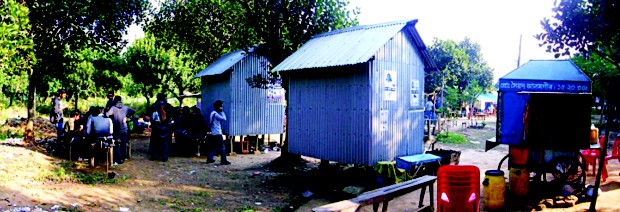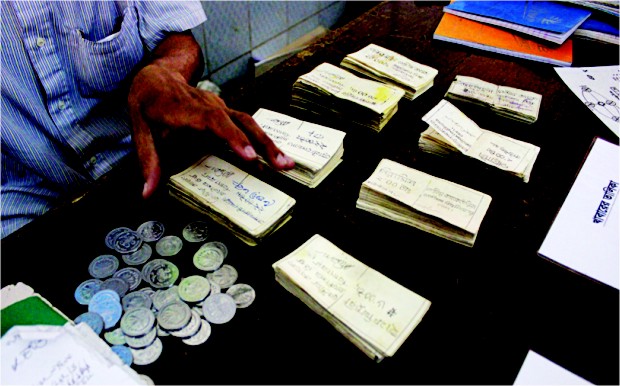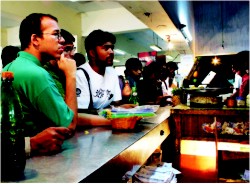|
Post Campus
University Education is Not Free- It has a Price
Asrar Chowdhury
Universities are vital components of a modern society. The logic is evident. Universities provide an educated and trained workforce to keep the wheels of the economy and the society moving. Universities also create minds that challenge and extend the boundaries of a society's knowledge and wisdom. Universities generate many positive external benefits that spill over to various pockets of the society. It is therefore not surprising that tuition fees in public universities in Bangladesh are nominal because education is an investment whose dividends the society enjoys over time. The state can bear short-term costs for long-term benefits.

The tea stalls at Jahangirnagar University. Photo Credit: Sevin
Although university fees in the Public Sector in Bangladesh are nominal at source, university education is not free for the recipients. Those who succeed in competitive exams for limited seats in the public universities find themselves bearing non-tuition costs. Assuming a university student spends five years in the university- with four years in the undergraduate programme and one year in the graduate programme- these costs can be substantially high for recipients and their families. As food for thought, let us look at the minimum expenses of students at Jahangirnagar University. The figures cited are based on the author's personal experience from interacting with students.
Jahangirnagar University is the only residential university in Bangladesh. This unique characteristic allows students from outside Dhaka to pursue tertiary education not having to worry too much about on-campus residence, as is the case for other universities in Bangladesh. The first cost students incur is food. Each hall provides lunch and dinner through a subsidised dinning and a non-subsidised canteen. Food is also available at various on-campus outlets. For breakfast and snacks students rely on on-campus outlets. Students spend at least Tk 100 per day on food. There is a one-month summer vacation and another one month for Eid & Puja vacations for which students reside on the campus ten months each year. In ten months students at Jahangirnagar spend Tk 30,000 on food each year.

Although university fees in the Public Sector in Bangladesh are nominal at source, university education is not free for the recipients. Photo: Kazi Tahsin Agaz Apurbo
The next component of expenditure is telecommunication and transport. Transport includes rickshaw rides and trips to Capital Dhaka. Students spend Tk 300-Tk 500 on mobile phones and internet every month approximately. At Tk 400 per month, students spend another Tk 5,000 per year on this head. Travelling expenditures vary. Not all students ride rickshaws and also not all students frequently go to the Capital Dhaka. Nevertheless, students tend to spend at least Tk 200 per month on average on this head. This would amount to Tk 2,000 in ten months each year. Keeping a count? So far, annual expenses have gone to Tk 37,000 per year.
 |
Photo: Kazi Tahsin Agaz Apurbo |
On books, photocopy and the like students at Jahangirnagar spend around Tk 3,000 each year. Annual clothes and fashion expenses do vary substantially, but it would be safe to assume Tk 3,000 each year on this head. The final major expenditure is going home during vacations and in between vacations. Assuming students go home four times each year and spend Tk 500 on a round trip, annual costs on this head amount to Tk 2,000 per year. The final amount now comes to Tk 45,000 per year or around Tk 50,000 per year including other miscellaneous expenses. Assuming no inflation (which will never be the case) a five-year university education would cost at least Tk 250,000 in today's money at Jahangirnagar.
The above figures are conservative estimates. There will be variations and students do tend to spend more. Nevertheless, this casual reflection establishes the hypothesis that public university fees in Bangladesh may be almost free at source, but university education does have a substantial cost for many families in Bangladesh. What are the social consequences of this cost? Let us leave that up the sleeve for another day.
(The author teaches economic theory at Jahangirnagar University and North South University.)
|
